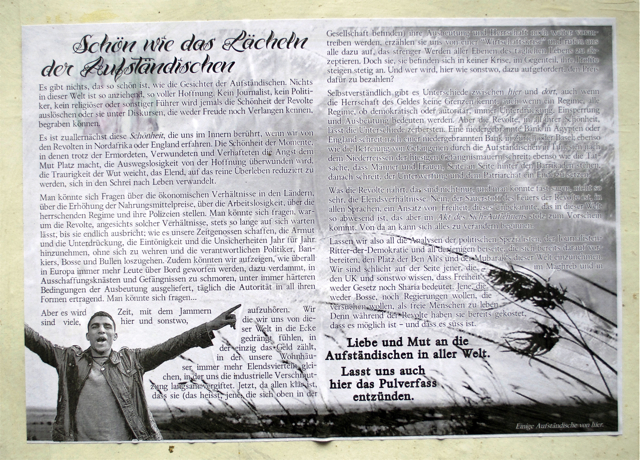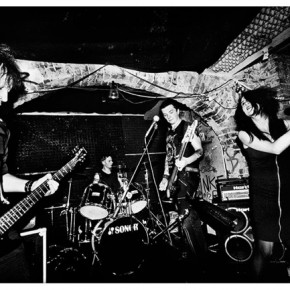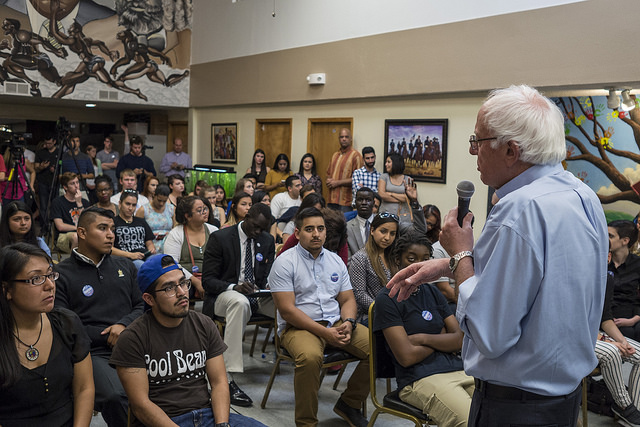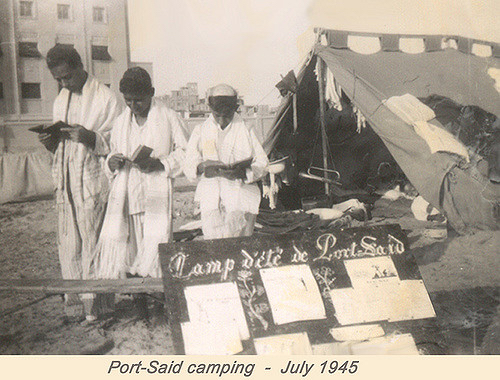There is nothing so beautiful as the faces of insurgents. Nothing in this world is so attractive, so full of hope. No journalist, no politician, no religious leader or other sort of leader will ever be able to extinguish the beauty of the revolt or bury it under discourses that know nothing of joy or longing.
It is first and foremost this beauty that touches us inside, when we learn of the revolts in England or North Africa. The beauty of those moments, in which despite the murdered, wounded and arrested, fear makes way for courage; the no-way-out mindset is conquered by hope; sadness gives way to rage; and the misery of having been reduced to pure survival turns into a cry for life.
One could ask questions about the economic conditions in countries, about the rise in the price of sustenance, about unemployment and the ruling regimes and their police. One could ask why the revolt, in light of those circumstances, still has to be waited for, until it finally breaks out; how our contemporaries manage to take the poverty and oppression, the monotony and insecurities, year after year without defending themselves and going off on the politicians, bankers, bosses and cops who are responsible. We could give proof, in addition, of how, throughout Europe, more and more people are being thrown overboard, thereby damned to marinate in deportation centers and prisons, consigned to ever harder conditions of exploitation, to bear authority in all its forms on a daily basis. One could ask. . .
But the time to stop yammering has come. We are many, here and elsewhere, who feel this world has backed us into a corner, a world in which only money counts, in which our places of residence are more and more like slums, where industrial pollution is slowly poisoning us. Now that it’s clear to everyone that they (that means those who find themselves higher up in society) want to extend their exploitation and domination even further, they tell us of an “economic crisis” and ask us to accept that every aspect of everyday life is becoming more austere. But they do not find themselves in a crisis; on the contrary, their profits climb steadily. And who, here or elsewhere, will be required to pay the price for that?
Understandably, there are differences between here and there, even when money’s mastery knows no bounds; even when one regime, all regimes, whether democratic or authoritarian always come to mean oppression, confinement and exploitation. But revolt, in all its beauty, bursts the distinctions into pieces. A bank burned down in Egypt or England cries out for a bank to be burned down in Basel or Zürich; just as the liberation of prisoners in Tunisia cries out for the prison walls here to be ripped down; just as the fact that men and women stand side by side behind the barricades cries out for subjugation and patriarchy to be brought to an end.
What nourishes revolt are not only – one could almost say “not so much” – the conditions of misery. No the oxygen for the fire of revolt is, in all languages, the first sign of freedom, this unknown that is so absent from this world, but which, in the act of standing up for oneself comes proudly forward. From that point on, everything can begin to change.
Let us then set aside the analyses of political specialists and the journalist knights-of-democracy, who are preparing to assume the place of the Ben Alis and Mubaraks of this world. We are simply on the side of those in Maghreb and the UK and elsewhere who know that freedom doesn’t mean law or Sharia. Of those who want neither bosses nor governments, who want to try to live as free human beings. For during the revolt they have sensed that it is possible – and that it is sweet.
Love and courage to all the insurgents of the world.
Let us also ignite the powder keg here.
Original flyer title: Beautiful as the Smiling of Insurgents.
Translated from the German by Charlie Bertsch. Photographed in Zurich by Joel Schalit.





